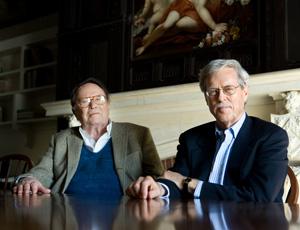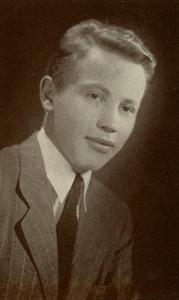April 27, 2009
When a reader searches Richard Wilbur’s name on The New Yorker magazine’s Web site, an incredible 99 results mentioning the prolific poet and member of the college’s Class of 1942 appear. (To put that in context, look up “Robert Frost” and 56 links pop up, while “Emily Dickinson” generates 75.) The pieces themselves are quite impressive, not surprisingly: They include Wilbur’s poems, reviews of his books and translations and other miscellaneous references, such as an intriguing letter by Norman Mailer that cites in passing an invitation Jackie Kennedy made to said Amherst alumnus in the 1960s.
 |
Wilbur’s poetry, of course, comprises almost all of the results. The magazine has accepted page after page of his submissions as far back as 45 years ago and as recently as January.
“The present [poetry] editor is Paul Muldoon, and I’m happy to say that he has a soft spot for my poems,” said Wilbur of his long relationship with The New Yorker. And exactly how many of his submissions has the magazine printed? “Quantities.”
Wilbur has been composing poetry since his college days at Amherst and publishing in The New Yorker and other celebrated literary magazines nearly as long. After graduating and serving in the U.S. Army in World War II, he did graduate work at Harvard and embarked on an epic writing jag that has resulted in 10 volumes of poetry and numerous translations of plays and poems in French, Italian, Russian, Portuguese, Spanish, Hungarian and Bulgarian. He taught at a number of institutions as well—Harvard and Wellesley and Wesleyan colleges, to name three—and held the esteemed position of U.S. poet laureate before retiring from the faculty at Smith College in the 1980s. His body of work has earned him two Pulitzer Prizes in poetry, the National Book Award, two Guggenheim fellowships, the Gold Medal for Poetry from the American Academy of Arts and Letters and France’s chevalier of the Ordre des Palmes Académiques, among many other honors.
These days, Wilbur is back at his alma mater, co-teaching “Writing Poetry I” with David Sofield, the college’s Samuel Williston Professor of English. Coaxed into returning to campus and serving as a John Woodruff Simpson Lecturer by Sofield and President Anthony W. Marx, he makes the trek from his home in nearby Cummington, Mass., once a week to talk iambic pentameter, onomatopoeia and other poetic devices with a group of 13 students. And while he admitted that coming out of retirement after such a long break was a bit daunting at first, the 88-year-old said the idea of teaching again at Amherst wasn’t too hard a sell in the end. “I’m enjoying it quite a lot,” he said. “In many ways, it feels like the place we in the Class of 1942 knew.”
Wilbur spoke recently with the Office of Public Affairs’ Caroline Hanna about his homecoming, his craft and his own professors at college. To learn more about the first poem he ever published, a conversation he had with legendary New Yorker editor Katharine White (yes, that would be Mrs. E. B. White) and his approach to writing poetry, watch the video interview.
Highlights
CH: How was it that you came back to campus?
RW: I don’t know exactly what the machinery of it was. I do know that Tony Marx looks kindly on my poems. I also know that there are quite a few people at Amherst with whom I’ve been friends for a long time who think well of my work—Bill Pritchard, for example, and certainly David Sofield. For a long time, David and I played doubles tennis together. It was always wonderful playing with David; he’s an excellent player, and if I made a mess of things, he could cover the whole court. It’s very pleasant to be working with him. I’m looking forward to next year.
CH: How did you feel when Professor Sofield spoke to you about this?
RW: I had 20 years of retirement after I left Smith College, and naturally, of course, I busily set about forgetting a lot of the scholarship I had known. I set about writing poems and doing some further translations of the great dramatic authors of the French 17th century.... So when I was invited back to Amherst I was of two minds. The idea of coming back was heart-warming, because I’ve always loved the college and the idea of teaching with David sounded splendid to me. At the same time, I felt that I didn’t want to be blocked from the writing that I had been entirely free to do. But I’m happy to say that it’s worked out very well. My poems and translations come along at about the proper rate. I’m still on good terms with the muse.
CH: Did you take poetry classes at Amherst during your own college career?
RW: No. When I was at Amherst as an undergraduate, there was one poet on the faculty—his name was David Morton. I was in a freshman English course of his, which was actually not a very distinguished course. He was a nice man, but he was not a great scholar. When poetry began to excite me at Amherst, it was through teachers like Theodore Baird, [George] Armour Craig, George Roy Elliot and George Whicher, who published the first considerable critique of Emily Dickinson. My teachers—especially in English—were wonderful. Not only were they greatly prepared for our classes and interested in us as students and as persons, they were also very encouraging if you had an inclination to write something. I showed some of my earliest attempts at poetry to the teachers I mentioned. They were very willing to give time and encouragement to young writers quite apart from the courses we were taking. They all, bless them, took me seriously as a writer of poems. They told me what was wrong with what I was doing and how I could make it better, as well as what I ought to read in order to be properly inspired.
CH: What is your approach to teaching?
 Wilbur’s senior photo, 1942
|
RW: One can’t really teach poetry; one can facilitate it. Actually—I didn’t do this in my poetry course at Amherst because I was taking my lead from David Sofield, who has taught poetry for a number of years here—what I always used to do was give people a stupefying first two hours of instruction in prosody. I found that that really cut down the size of the class. It also gave us a few terms in which to describe each other’s faults…. I do think that there’s a moment in the life of many a student in which he or she feels it might be possible to give a lot of time to writing poetry, that that might be a way of putting one’s world in order for a bit. I think it’s good to encourage that. In every class of poetry writing, I imagine that only two or three out of the fifteen will prove to be publishable poets, but that doesn’t matter. The important thing is to get oneself eloquently off one’s chest. Even if, in taking a course of that kind, one doesn’t write any distinguished poetry, one unquestionably develops a critical gift.
CH: You’ve won many accolades and honors throughout your career, traveled the world, seen and done so many things. Is there something that you want to accomplish that you haven’t been able to do yet?
RW: I guess what I really want to do is finish what may be my last book of poems, and to have it be full of better poems than I’ve ever written. I’m happy to say that I still have my wits about me, and recently I have written two or three poems that do seem to be among my best. But I could very much use a last book or so in which I’ll still be getting better.